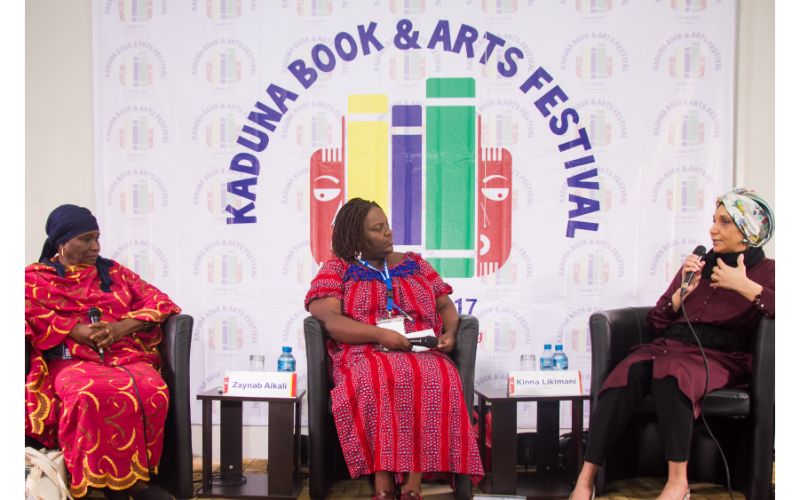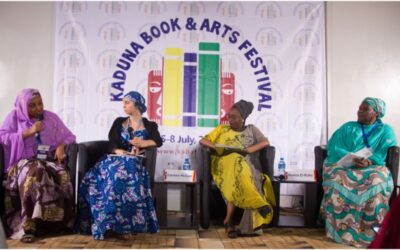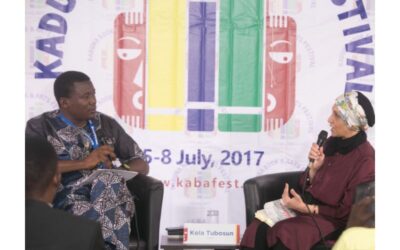More than a Hijabi: Muslim Women Writing for the World
The panel was anchored by Kinna Likimani. The Sudanese writer, Leila Aboulela stated that this was her first time in Kaduna as it reminded her of her native country Sudan. This was because of the similarity in lifestyle and mode of worship; the people entering the mosque with their kettles, the call of the muezzin at prayer time and the dress sense of the Hausa women. She came to writing because she was an insatiable reader and found solace in books and the possibilities they manifest. She migrated to Scotland to be with her husband and two kids after Sudan fell on hard times. She had a short stint in the teaching profession but abandoned it because it was unfulfilling and the children were rude and naughty. Though she went back to pursue a doctorate degree in statistics, she started writing to explore her immigrant status and the women issues around her. More importantly, she wrote to create an image of Sudan to the world.
Zaynab Alkali expressed her excitement at meeting the daughter of her friend. She recalled their encounter with Ama Ata Aidoo in Dallas, United States on the occasion of her 70th birthday. She came to writing because she was a bad speaker, and wanted her writing to empower women across spheres. Of prominence in her evolvement as a Writer was the role that Professor Steward Brown played. He established a journal in Bayero University Kano called Kaakaki. He was the first to receive her manuscript of thirty pages, and read it on the BBC while on vacation in England.
Since then writing has become for her a form of therapy. It captured her psychological development as an individual. She recalled the case of a cousin who was married off as a child and later suffered from vesico vaginal fistula and the trauma and pain she endured. She said this made her“…imagination to go wild and she educated her”. This influenced the portrayal of a character in her novels. She decried the lack of psychologists to tackle and manage mental health issues and problems.
For Leila, her displacement from Sudan to the west afflicted her in the form of nostalgia or longing for home. She was often faced with the problem of inner conflict in reconciling her dual identities. For example, when she was in Sudan, she saw herself as a feminist fighting for the economic empowerment of women. In the west, she found their brand of feminism extreme. She was not contesting for equality with a man, but believed in the equality of human beings.
Zaynab Alkali buttressed the point that her characters were mostly secular in nature because she grew up in a family that had three Christians and three Muslims who lived in peace with one another. She gave the example of her father who was a Muslim but who was hospitalised in a Christian hospital and later converted to Christianity, Alkali stressed that the girl child must strive to acquire both western and Islamic education and how to combine the best of both worlds.
On the culture of women wearing Hijab, Alkali stressed that it was not just peculiar to Islam because nuns and even Victorian women wore it, or its equivalent as a sign of modesty, decency, respect and honour. In recent times, people feared the Hijab because women have abused it by hiding explosives. She recalled how she was embarrassed on two occasions on a reading tour of her books at the airport in Amsterdam, in 1994 and in Dallas, 2012. She said she felt she was harassed and gazed with suspicion and hostility because she wore a Hijab. She asserted that the Hijab in the modern context had become a form of distancing between you and the world. Aboulela offered that there should be a balance between spiritual and social life, and worship must be approached with humility. Though wearing the Hijab was not a big deal, it must not be approached with arrogance.
Kinna asked if they were feminist. Leila Aboulela said “in Sudan, I am feminist, in the west, feminism is alienating and extreme. I am not opposed to patriarchy but oppose to injustice.” Zaynab Alkali distanced herself from radical feminism, but aired her support for women economic empowerment. She gave an anecdote to illustrate the nexus between Men and women in society as the relationship between the brain and the heart.


